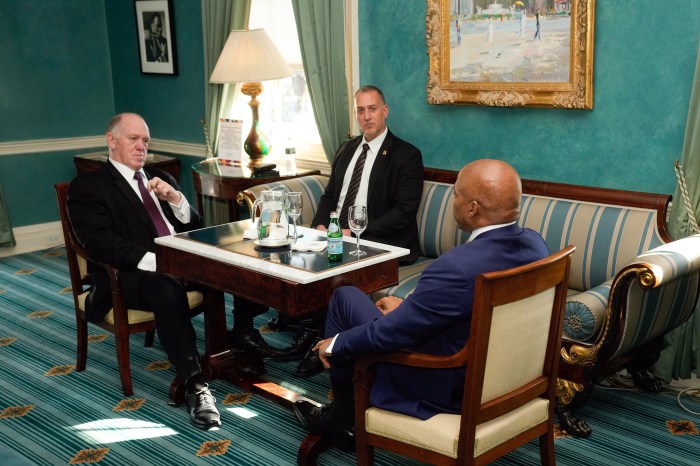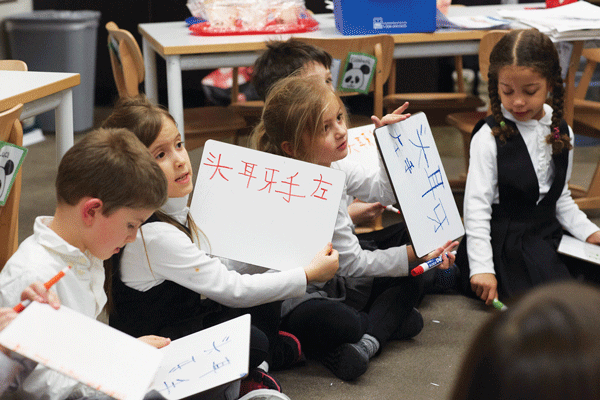
These young Avenues students have chosen Mandarin for their language immersion. The Beijing campus opens in 2016.
BY WINNIE McCROY | When CEO Chris Whittle opened up the $75 million Chelsea campus of Avenues: The World School in 2012, it was the realization of more than five years of planning. Now, with the school having wrapped up its second year, Chelsea Now takes a look at the immersive bilingual educational facility.
“We think all schools are different, and that doesn’t necessarily mean better or worse,” said Whittle. “For example, we are the only top-tier school in the city that has this immersion program. Different schools have different strengths, and this happens to be ours.”
Whittle revolutionized the charter school movement when he founded Edison Schools. His educational philosophy focuses on identifying each student’s passion and giving them a deep understanding in that area. Because private schools are not regulated by the Department of Education, they don’t have to follow the same curriculum as public schools.
Avenues: The World School (avenues.org) was the largest private school building project in the history of the city. Ultimately, the plan is to create “a unique and dynamic educational village — one school with 20 or more campuses in major cities in Asia, Europe, Africa and North and South America.”
Paris, London, São Paolo and Mumbai are among the announced locations. By 2016, the Beijing campus will be open, and students can begin taking advantage of the study abroad option. The school will feature 2,000 dorm rooms for both local students and for those across the world who want to study in China.
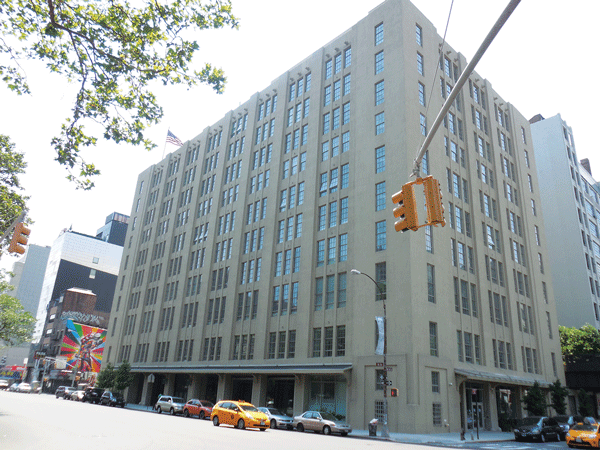
The Avenues New York campus, on 10th Ave (btw. 25th & 25th Sts.).
SCALING UP THE STUDENT BODY
As part of their planned scale-up to 1,630 students in four years, Avenues’ inaugural class started out with just 740 students. Last year, they had 1,100 students, and next year, there will be 1,300, including their first class of 11th graders. Eventually, the school will cover students from pre-K through 12th grade.
Within Avenues’ 10-story building (at 10th Ave. & 25th St.), there are actually four schools: a nursery school, a lower school, a middle school and a high school — each with a double-story commons area with couches and chairs, flooded with natural light and overlooking the High Line. Class size is 18 students, and outside of well-appointed classrooms are high-definition virtual “bulletin boards,” programmed by the classrooms to allow for student exhibits.
Long before Avenues opened, Jay Van Buren and his wife were hired to work on the school’s website. Longtime marketers, the Brooklyn couple brought a healthy dose of skepticism to what the school said about itself — but were soon sold on the idea, and applied to get their son Theo into the school.
Avenues ended up hiring Katie Van Buren as director of the school’s Innovation Lab, and Theo will start pre-K in the fall. He began his language immersion in nursery school, and his parents are thrilled that he has taken to singing a song from “Frozen” in Chinese.
Abby Brody, Director of the Avenues Lower School, was also involved with the school before it opened. In fact, she was the first hire. She was teaching at a private school on the Upper East Side and found herself frustrated over the static curriculum there. She decided to start her own charter school to create “citizens of the 21st century.”
After chatting with Whittle, she scrapped her idea within two days, and signed up to be part of a “best practices school.” She was overjoyed to discover that Avenues wasn’t afraid to make changes. Most private schools, asserts Brody, “are very scared of change. They don’t want to look weak in front of the parents.” Avenues’ conscious favoring of evolution entrenchment is, Brody believes, an important element of what sets the school apart — and encourages collaboration between parents and teachers.
“They’re risk takers,” said Brody of the faculty. “Even though our kids are from wealthy families, they are coming in with a culture that values humility. The parents know the mission statement, and the teachers build a community based on a bigger self-awareness, that kids should know when to be a leader and when to be a follower. They realize that there’s a world beyond New York City.”
While mapping out the curriculum they envisioned, educators constantly refer to Avenues’ mission statement, which includes sharing prosperity through financial aid, providing faculty support and advancing education as an effective, diverse and accountable school. The mission also addresses the idea of graduating emotionally unafraid global citizens, while nurturing a sense of humility — something that could be difficult for children of extremely wealthy parents.
Whittle said that Avenues initially achieves this by spending a tremendous amount of time carefully choosing who they admit, not only to be sure they can handle the rigorous, bilingual curriculum, but making sure that families understand how things work at Avenues.
“We want our kids to welcome everyone. We want there to be a culture of respect, and we want there to be safety — not just in a physical sense, but also in an emotional sense,” said Whittle.
The Van Burens love the school’s mission statement and how they use it as a touchstone in internal discussions. They can sense the happiness it has created in their son, saying, “Theo was jumping up and down on the day that spring break was about to be over. He loves the school as much as we do!”
Parent Paul Spencer said his daughter Willa was also thriving at Avenues. Watching the school under construction, he likened it to a ship being readied for its maiden voyage, saying, “We were very happy to be its first passengers. It was exciting that they were taking on this experiment. My feeling was that if they make mistakes, they can correct them.”
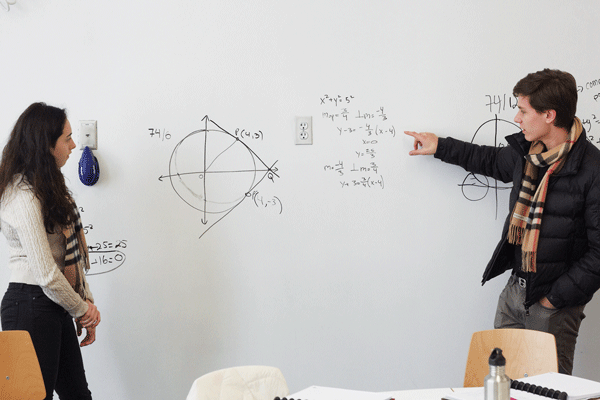
Hands-on learning helps bring concepts to life — and math to walls.
CRITIQUES AND CRITICISMS
When Avenues first opened, issues arose — such as the impact of celebrity students like Suri Cruise, the variety of food offered in the school cafeteria, and safety concerns about the homeless individuals in the area.
“In opening a school this size, which has a staff of well over 200, there are always going to be issues, and food in any school is always a topic of conversation,” said Whittle. “So in our early days we worked through it, because different students had different health needs. But we did that very nicely and it’s no longer an issue.”
And although they don’t comment on individual students, regardless of how famous their parents may be, Whittle said that they select families that will be part of the community, saying, “we would not be growing the way we are if there were not a positive experience happening.”
“I haven’t noticed anyone getting any special treatment or attention,” said Spencer. “In fact, whenever I’ve seen Suri and Katie — who obviously takes a personal interest in her daughter — she’s often the one who picks her up and drops her off. The two of them seem pretty much like any other parent and child, doing the same things the rest of us do.”
Another concern came via a now infamous exchange known as “the butt crack e-mail,” in which a parent complained that her child had witnessed the bare posterior of one of the local street people.
Paul Spencer said that like most Avenues parents, he and his wife were “appalled” by the negative publicity of parents complaining about the food, or the “unsavory characters” in the neighborhood. He said that while every school has helicopter parents, focusing on the concerns of a few had created a distorted view of Avenues.
“The pros hugely outweigh the cons,” said Whittle. “This is one of the most vibrant and rapidly developing neighborhoods in the city. Two things we particularly like about it is that for an arts program, we couldn’t be located in a better place. I laugh sometimes when I go to the art studios and they’re empty, because students are out and about, visiting the galleries. We love the connection to the Chelsea art community.”
Whittle also appreciates the Silicon Alley element, with tech companies Google and Quirky both nearby, noting that Avenues is developing a variety of connections with these firms. And then there is the High Line.
“The High Line is terrific, particularly with the opening of the third section,” said Whittle. “It’s a great way for parents to walk their kids to school without crossing streets. You can walk eight to ten blocks in either direction without worrying about stoplights.”
The Van Burens take that trek with their son Theo several times a week, and said that, “as far as safety and security, there have been no problems. There’s a crossing guard at the corner who makes sure the kids get across okay.”
And that butt crack email? “New York is New York. It has its issues and it always will, but that’s just urban life,” said Whittle. “Both the parents and the students in the community are fine with that.”
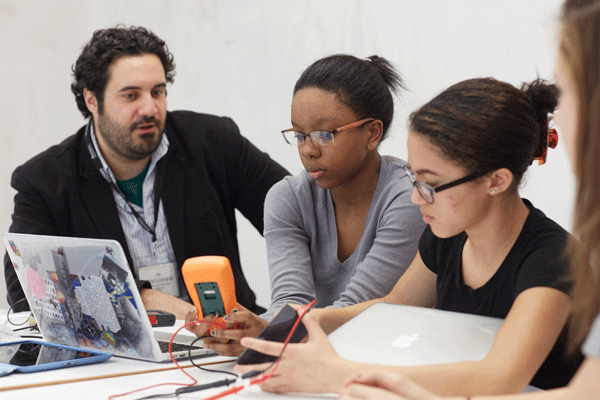
Small student-to-teacher ratios allow for individual attention.
IMMERSIVE EDUCATION
What most distinguishes Avenues from other private schools is their immersive language program. Students learn all subjects, from math to music, in either Spanish or Mandarin Chinese until they are 10 years old, resulting in true fluency, then take conventional language instruction.
David Berney and his wife Lynn have three children at Avenues: a daughter who is entering pre-K, a son in second grade and a son in third grade. They love the language skills the program affords their kids.
Whittle said that by all accounts, the immersion program is working excellently, but noted that some changes were made in how it was organized. When they first opened, students would spend half a day in their immersion classroom and half a day in their English classroom. Teachers found it laborious to shuffle students around, and after a pilot program, the procedure was altered. Now, students spend one day learning in English, and the next day learning in their chosen immersion language. Parents and teachers alike are thrilled about the change.
The Van Burens agree, saying that their son didn’t seem to mind the change from half-day language sessions to every other day, and that teachers found it allowed them to have more continuity. They love how the immersion program is giving their son a leg up, citing a study that found learning another language aids in the ability to think creatively.
“That too is part of what goes into creating a new school,” said Jay Van Buren. “They aren’t relying just on what it’s always been. They try new things to see what works. For example, the older kids use the Harkness table method, where they learn by sitting around a table and discussing things, and that goes back decades. Avenues is taking some things that are old and some that are new and using the best of everything. The whole approach is focused on trying to ask the question, ‘What is the best quality education now?’ ”
David Berney echoed this sentiment, noting that he and his wife Lynn are impressed by how teachers and administrators constantly listen to students and parents, and then make adjustments. They are fascinated by the degree of fluency their three children have gained in such a short time. When they take the kids to Flushing, Queens, they can read street signs in Mandarin, and talk to the many Chinese residents in the area.
This prompted the Berneys to speak with administrators about keeping their kids’ language skills sharp over the summer break. Last year, they worked with the school to arrange online chat sessions between students and teachers. Now Avenues has an online summer language program that allows students and teachers to Skype in Chinese or Spanish.
“It worked so well last summer, we expanded it significantly this year,” said Whittle. “You will literally see kids out on a beach somewhere Skyping in Mandarin with their teacher!”
The Berneys point to this interaction as proof that when parents have ideas that can benefit everyone, the school is responsive. The Spencers love it as well, saying that their eight-year-old daughter Willa loves using her Mandarin language skills whenever possible. They recently connected with a couple in Columbia County who run a Chinese restaurant.
“We set up play dates with their kids, who speak Mandarin but don’t read or write it,” said Spencer. “There was even a funny moment when Willa was showing their 12-year-old son how to spell something in Mandarin, and what a character meant.”
TUITION PAYS FOR IT ALL
A year’s tuition for Avenues costs about the same as tuition for any other private school in the city — about $45,000 per year with fees (except for those students who receive financial aid).
“Everyone pays the same tuition, and we have no idea who gets financial aid,” said Lynn Berney. “It’s all the same, whether you are super wealthy or struggling to make every penny count. We know that we’re not going to be nickel and dimed for everything. It’s how it should be. Everyone should have the opportunity to get the same education, regardless of their socioeconomic background.”
Avenues doesn’t ask for or accept any additional funding from parents. In fact, that’s how Whittle planned it all along. Prior to opening Avenues, he gathered $75 million in investments — $60 million to rehab the 100-year-old former warehouse into a school, which they have a 48-year lease on, and $15 million for pre-opening expenses, including teacher recruitment, curriculum design and more.
“Our policy is, and will continue to be, that we don’t do capital campaigns,” said Whittle. “We don’t do annual funds, we don’t do any fundraising for core programs or to increase faculty pay. All those things we do out of standard tuition and don’t expect parents to do anything beyond that.”
As a for-profit entity, they provide the capital for all of the school’s needs. If they need new computers, they’ll buy new computers. If they need a new gymnasium (they don’t — their current gym is stunning), they’ll buy a new gymnasium. This eliminates the constant browbeating of wealthier parents to support the school financially, and it takes out of the equation the ability for deep pockets to make up for student’s shortcomings, as is sometimes the case at other schools.
“It completely levels the playing field,” said Whittle. “We don’t care if your parents are billionaires. Money is not a factor in how a family or student is treated. The only two areas we will let parents do fundraising in is to increase financial aid and scholarships, or to fund ‘research and development’ into new learning strategies that would be beyond what the school could typically cover,” he said. “But the core thing here is that there is never going to be any arm-twisting of parents for extra money.”
Spencer likes the optional fundraising, saying that scholarships could help Avenues with “the same problem that most private schools in New York suffer from: a lack of diversity. It will probably take a little while to resolve that.”
The school currently has about 10 percent of students on financial aid, with an agreement reached with Community Board 4 to pro-rate the aid to children from Chelsea first.
GRADUATING CITIZENS OF THE WORLD
When Chelsea Now first profiled Avenues: The World School, we asked Whittle if the school would churn out scholars to help populate Harvard University and other Ivy League Schools. Even then, he warned that those schools were prohibitively competitive, and not ideally suited for every student’s needs. He maintains that Avenues is more concerned with graduating contributing citizens of the world, rather than a generation of future kingmakers. Avenues parents also seem to be okay with this.
“If you want your child to grow up with a worldview and international experience and language skills, then we’re a terrific choice. If that’s not important, there are schools that are better for you,” said Whittle.
“That’s a big part of Avenues going forward,” said Whittle, referring to the school’s global expansion student exchange plans. “Even before our campuses open in all the other cities, we want to offer all sorts of study abroad programs.”
The Berneys look forward to the day when their children are old enough to take advantage of this exchange program, saying, “It would be great for them to have the opportunity to live with another family, to be there and use their language skills and still get an Avenues education, knowing that the style and programs will be consistent throughout Avenues schools around the world.”
For now, they are just trying to get through the rest of the summer. When Lynn Berney arrived 45 minutes before dismissal on the last day of school, she could hardly believe what she saw. “Rather than being happy about the last day of school, they were all crying, hugging their teachers, giving them little gifts they made in art, and bawling. There has not been a single day in two years that our kids tried to get out of going to school. And I’ve heard this from other parents as well. This is truly what it is all about.”

The nearby High Line provides a year-round way to commute, and learn.
Spencer echoed these sentiments, saying that when the school started, its theories were very appealing to him — but over time, it was the connections that made the most impact.
“Willa got there and all of the teachers were warm and loving. The way they hugged her and lifted her up, how she was so excited to go to school every day — that was a pretty good combination to have,” said Spencer. “We are not tiger moms and dads, not helicopter parents. To me, it’s less about what’s going to get her into Harvard or Goldman Sachs, but that’s she’s taking a real joy in learning, that she is really happy to be there.”




